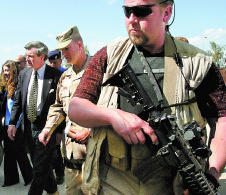GUNS FOR HIRE

A flurry of reports in recent days have focused on the role of mercenaries -- or "private military companies" as they prefer to be known -- in various troublespots around the world, most notably Iraq where around 15,000 civilian security guards are believed to be working.
The Economist highlighted what it called a "Baghdad Boom," noting that Iraq has boosted British military companies' revenues from £200m before the war to over £1 billion.
The four men killed and horrifically mutilated in Fallujah recently were employees of the private security firm, Blackwater.
Blackwater also made the news in Washington Post, which carried a report saying that that an attack by hundreds of Iraqi militia members on the US government's headquarters in Najaf on Sunday was repulsed not by the US military, but by eight Blackwater commandos.
Time magazine, the New York Times and the Toronto Star have also carried reports on the role of mercenaries in Iraq, as has this week's Economist (subscription only.)
What amazed me was the sheer size of some of these private military companies. Far from consisting of a few wild-eye, trigger-fingered desperados, some are slick corporate entities with huge government contracts.
Blackwater, for example, has a training centre on a 6000 acre compound in North Carolina. It also has its own private air force. It even sells its own range of merchandise -- Blackwater gym shorts, anyone?
Despite the reservations some may have about the ethics of these corporate soldiers of fortune (who come with the added benefit of not appearing on lists of coalition military casualties), ultimately it comes down to good old fashioned supply and demand. The demand for people willing to risk their lives for money is clearly there -- and there seem to be plenty of people willing to volunteer.
As Peter W. Singer, who has who has written a book on private military companies says, "you have to think about this in terms of a marketplace."
Discuss

A flurry of reports in recent days have focused on the role of mercenaries -- or "private military companies" as they prefer to be known -- in various troublespots around the world, most notably Iraq where around 15,000 civilian security guards are believed to be working.
The Economist highlighted what it called a "Baghdad Boom," noting that Iraq has boosted British military companies' revenues from £200m before the war to over £1 billion.
The four men killed and horrifically mutilated in Fallujah recently were employees of the private security firm, Blackwater.
Blackwater also made the news in Washington Post, which carried a report saying that that an attack by hundreds of Iraqi militia members on the US government's headquarters in Najaf on Sunday was repulsed not by the US military, but by eight Blackwater commandos.
Time magazine, the New York Times and the Toronto Star have also carried reports on the role of mercenaries in Iraq, as has this week's Economist (subscription only.)
What amazed me was the sheer size of some of these private military companies. Far from consisting of a few wild-eye, trigger-fingered desperados, some are slick corporate entities with huge government contracts.
Blackwater, for example, has a training centre on a 6000 acre compound in North Carolina. It also has its own private air force. It even sells its own range of merchandise -- Blackwater gym shorts, anyone?
Despite the reservations some may have about the ethics of these corporate soldiers of fortune (who come with the added benefit of not appearing on lists of coalition military casualties), ultimately it comes down to good old fashioned supply and demand. The demand for people willing to risk their lives for money is clearly there -- and there seem to be plenty of people willing to volunteer.
As Peter W. Singer, who has who has written a book on private military companies says, "you have to think about this in terms of a marketplace."
Discuss

0 Comments:
Post a Comment
<< Home